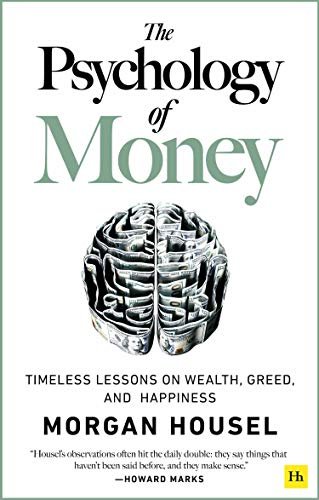The Psychology of Money

Rating: 4.6/5
Author: Morgan Housel
Publisher: Harriman House Publishing
Publishing Date: 8th September, 2020
Language: English
Genre: Analysis and Strategy
ISBN-13: 978-0857197689
Format: Paperback
Pages: 256
Cost: Rs. 1,488 (Paperback), Rs. 248 (Kindle edition)
Plot:
Money-investing, personal finance, and business decisions-is typically taught as a math-based field, where data and formulas tell us exactly what to do. But in the real world, people don't make financial decisions on a spreadsheet. They make them at the dinner table, or in a meeting room, where personal history, your own unique view of the world, ego, pride, marketing, and odd incentives are scrambled together.
In ‘The Psychology of Money’, award-winning author Morgan Housel shares 19 short stories and one commentary exploring the strange ways people think about money and teaches you how to make better sense of one of life's most important topics.
Review:
‘The Psychology of Mone’y by Morgan Housel examines personal finance through the lens of human behaviour. Housel’s focus is on the relationship between people and money with particular emphasis on the human variable of the equation. He says:
“To grasp why people bury themselves in debt you don’t need to study interest rates; you need to study the history of greed, insecurity, and optimism.”
Housel’s conviction is that behaviour trumps other considerations in the pursuit of financial success as he believes that doing well with money has a little to do with how smart one is and a lot to do with how they behave. He advices to engage in the right behaviours. Similarly, no amount of intelligence, savvy, or inside information will save one from the wrong set of behaviours.
Each of the first 19 chapters in the book explores an individual human behaviour or attitude towards money (and a commentary on Housel’s personal financial practices).
He goes on explaining about certain behaviours that induce positive outcomes while others guarantee failure. For instance, the first chapter titled “No One’s Crazy” considers the limits of our understanding vis-à-vis the limits of our personal experiences. Consider that we are all, in the grander scheme of things, woefully inexperienced. “Your personal experiences with money make up maybe 0.00000000001% of what’s happened in the world, but maybe 80% of how you think the world works.”
In other words, there’s a huge gap between first-hand knowledge and how we parlay those limited insights into making sense of the world. Our experiences colour our judgment, but the foundations of that judgement are dubious, incomplete, and full of blind spots.
The best part of his writing is that he takes the lessons from history, finance, psychology, etc. and applies it to everyday personal finance. This book can be read very quickly, but the whole point of reading it is to stop and think about how these stories apply to our own behaviour.
About the Author:
Morgan Housel is a partner at The Collaborative Fund and a former columnist at The Motley Fool and The Wall Street Journal. He is a two-time winner of the Best in Business Award from the Society of American Business Editors and Writers, winner of the New York Times Sidney Award, and a two-time finalist for the Gerald Loeb Award for Distinguished Business and Financial Journalism.














































